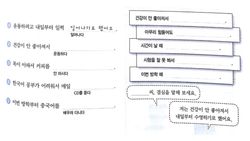Feb 25, 2022
Grammar -기로 했어요

-기로 했어요(2)
is used to express the speakers resolution or firm decision to do something in the future.
It is usually in the past tense because it describes a decision made in the past, even though the plan being made will take place in the future.
-기로 했어요(2)
It is always attached directly to the end of a verb stem.
➡️ 일어나다 -> 일어나 + 기로 했어요 -> 일어나기로 했어요
내일부터 아침에 일찍 일어나기로 했어요.
Starting tomorrow, i will wake up early in the morning.
➡️ 살다 -> 살 + 기로 했어요 -> 살기로 했어요.
한국에서 살기로 했어요.
I decided to live in Korea.



-기로 했어요 (1)
Is used to express an appointment or a promise made with someone else. it has the same meaning as ‘to promise to do something’.
This form is usually express in the past tense because it describes an appointment made with someone in the past, although the plan being discussed will take place in the future.
-기로 했어요 is usually attached directly to a verb stem.
➡️ 놀다 → 놀 + 기로 했어요 → 놀기로 했어요
주말에 친구들하고 놀기로 했어요.
I promised to hang out with my friends this weekend.
➡️ 보다 → 보 + 기로 했어요 → 보기로 했어요.
오늘 오후에 소라하고 같이 대학로에 가서 연극을 보기로 했어요.
I promised to go to Daehangno to watch musical with Sora.